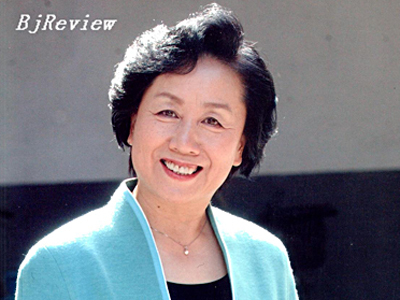
The secret of happiness should be like this: expecting it if it is still afar; enjoying it if it is all around you; and retaining it if it has gone. -Lu Qin
Lu Qin, associate editor-in-chief of Chinese Teenagers News, better known as nationwide "Zhi Xin Jie Jie" (literally "your intimate sister who can have a heart-to-heart talk with you"), in a recent interview with Beijing Review, shared her views on childhood and education for children and teens ahead of International Children's Day.
Beijing Review: in your book Good Parents, Good Kids you mentioned that "it will be a misfortune if one leads a life without a happy childhood". How about your childhood? Was it happy?
Lu Qin: Absolutely right! It was very happy and sweet.
I am the fifth child of my parents; I have three sisters and two brothers. It is a blessing to have such a big and harmonious family. The most precious gift I get from my family is to share with others; we learn how to love and take care of others. It has rooted in our life. In addition, my mother is a democratic person who has neither overestimated nor overindulged us. In other words, my family gave me a happy and sweet childhood although we led a simple life at that time.
Besides, the life in primary school played an important role in my childhood. I've spent six years in Shi Jia Hu Tong Primary School (now changed into Shi Jia Primary School) and enjoyed the life there. We were encouraged to attend various kinds of activities that could help to develop ourselves in a comprehensive way.
I was good at painting so I was in charge of editing, painting and writing the blackboard newspaper in my class. My capabilities of coordination and organization have been well developed during various kinds of social activities. I was given full trust and supported by my teachers and classmates. Thus, my sense of achievement and self-confidence has been gradually cultivated and nurtured.
To a great extent, childhood is really important. A happy childhood is extremely crucial to one's life. The happiness of the childhood has nothing to do with how much money you have. Rather, it derives from a position where your interest and capabilities are allowed to develop.
There is a controversial problem related to education of young children in China. Most kids, reluctantly or not, have to join "hobby classes", they range from singing, dancing, drama, to English, and mathematic studying, over the weekends. It seems as if kids nowadays are bearing more pressures than before; a happy childhood seems a "mission impossible". What's your comment on this phenomenon?
Everything has a "balance" inside. Joining "hobby classes" has been overdone; and overdone means "burden".
Kids nowadays are dead tired, and sometimes exhausted, compare to my childhood. Their schedules are always fully arranged like this: go to school from Monday to Friday and spend four half days on hobby classes over the weekends.
To be honest, the origin of those classes was good; it helped to develop kids' interest and talent in different areas. But what turns out to be terrible is that only the "utilitarianism" will be left if kids join those so-called "hobby classes" without any hobby.
Honored as "Zhi Xin Jie Jie" nationwide since 1980s, you are considered as a senior expert on education. In your opinion, how is the psychological status quo of younger generation in China?
Not so good as far as I know.
The younger generation was born after 1980s; they have no brothers or sisters because of the "one-child" policy. They led a better life compared to their parent's generation. They have problems with studying, making friends, and applying for jobs. At the same time, they have to deal with multiple pressures from family, school, and society. It is really a big challenge to them all.
| 